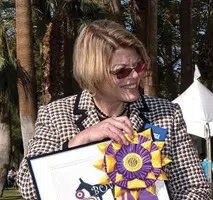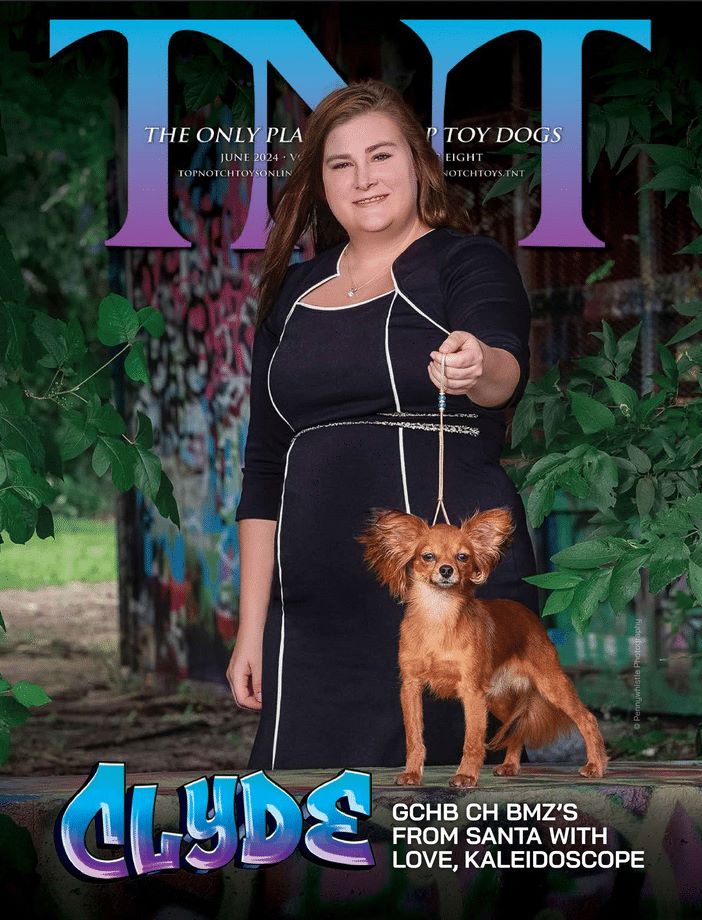Judging a Manchester Terrier | Despite two decades in the breed and a successful breeding program, judging was not something I seriously considered until the second half of 2020 as dog shows began to open up following the COVID-19 lockdowns.
You should go for your license. You would make a great judge.
Those were nice compliments that I heard from attendees at Judges Education seminars I’d presented on behalf of the American Manchester Terrier Club.
Since I wasn’t traveling abroad for work, I was going to more dog shows. I had always had an exit strategy as a breeder, but the “what next” question had also always been on my mind. Being able to attend more shows made me realize how much I wanted to stay active in the fancy, and I assessed what I needed to do before applying to become a judge—match judging assignments. I was able to complete those in February and I started the New Applicant process in March.
By June, I was approved for Permit status in Manchester Terriers. The process that seemed so daunting on paper went smoothly, with my application filed, tests taken, application published in the AKC Gazette, and an Executive Field Rep interview passed, all within a matter of months. By October of 2021, I had contracts for three assignments in Manchesters, plus a Papillon Sweepstakes
for 2022.
It all happened so fast thanks to great support from the Judging Operations team and with encouragement from friends who are judges.
I was now a new breeder-judge.
The rules literally changed for me overnight. I was very familiar with the AKC’s Ethics Policies, etc., but the Basic Institute and Webinar series I’d attended last fall really drove home certain realities about judging in general, and about being a new breeder-judge who is still actively breeding and showing in a low-entry breed in particular. What do I do? How do I manage actual or perceived conflicts?
I have lived in three states and worked with so many people in the breed over the last two decades. Manchesters are a small breed, and my husband and I started showing in California before moving east. I literally know everyone. I was aware that with a low-entry breed I could get Regular status with six assignments, regardless of entries… but I want entries. I want to be observed. So, I did the following:
- I reached out to several longtime judges who were still active breeders, and I received some very sound advice.
- I reached out to people with whom I have actual conflicts (co-ownerships, puppies from me or back from breedings within the time limit, etc.) and I explained the rules to them.
- I explained the rules to several people who thought they had conflicts, but did not.
- I changed settings for tagging in social media based on Tim Thomas’ advice at the
Basic Institute.
- I started saying “no” to certain requests, to avoid new conflicts.
When entries closed for my first assignment in both varieties at the Kennel Club of Palm Springs, I had 19 Standards and 16 Toys. I was genuinely humbled and grateful to see the trust my fellow fanciers and parent club members put in my judging of the regional specialty. It was my first assignment and a really wonderful experience.
The First Assignment
On January 7, 2022, I flew to Palm Springs from Knoxville, Tennessee, to judge both varieties of Manchester Terriers for a Designated Specialty. My flights were easy and uneventful—the best kind of trip.
As I deplaned, though, I thought to myself, “Ok, tomorrow I judge my first regular assignment as a newly minted judge with Permit status in a single breed with an entry of 35 at a specialty at the Kennel Club of Palm Springs!”
I wasn’t worried about actually judging the dogs—this was my breed, after all, but procedure that becomes automatic for experienced judges was new to me. Since receiving Permit status in June, 2021, I had judged FSS/MISC and 4-6 Month Beginner Puppy at an event as a last-minute substitute for a judge who was quarantined in late September, but this was my first “regular” assignment.
I studied that night—a lot. I re-read all the procedural materials from the AKC Basic Institute that I had taken two months earlier and I re-watched the AKC Weighing and Measuring video four times. I planned how I would run my ring, the instructions I would give my steward, and exactly how I intended to examine and gait the dogs. If that seems excessive, my job title is literally “controller,” and being prepared is in my DNA.
The next morning, as I looked around the lobby restaurant at my hotel, I saw a sea of familiar faces—judges I had shown to or stewarded for over the years were chatting amiably over breakfast. Then I joined some of them on the judges transportation bus to the Polo Grounds.
“Wow,” I said to myself. “This is really happening.”
Arriving at the show grounds, my nerves were overcome by nostalgia. My foundation bitch had won her first major at this remarkable show with my late mentor. I have 20-year-old photos of the hot-air balloons taken from RV parking. I knew this place, and the sheer beauty and scale of the show was comforting rather than overwhelming.
After checking in with the Field Reps, I had two hours until my assignment. Both the working club members and the accommodations in Judges Hospitality were remarkable. The judges I sat with were kind and encouraging, particularly upon learning this was my first assignment. I even received some wonderful advice from judges I admire on how to proceed from a single breed.
As my ring-time approached, I said to myself, “You can do this.”
I did successfully complete the assignment while being observed. I had a great ring steward in Hans Kabel. (As a frequent steward, I recognized just how good.) What surprised me was that the actual judging of dogs was harder than I’d expected. I had large, competitive entries in both varieties, which is a great problem to have, but comparing Manchester Terriers is second nature to me. While judging, though, I was also consciously thinking about procedure and time. I knew going in that this would be a challenge, but it was harder than I’d expected despite all the preparation.
Overall, it was an amazing experience and I heartily thank the members of the Kennel Club of Palm Springs for allowing me to be on the 2022 panel for one day, with just two varieties of a single breed.
Judging a Manchester Terrier | The Newbie – Just Do It!










